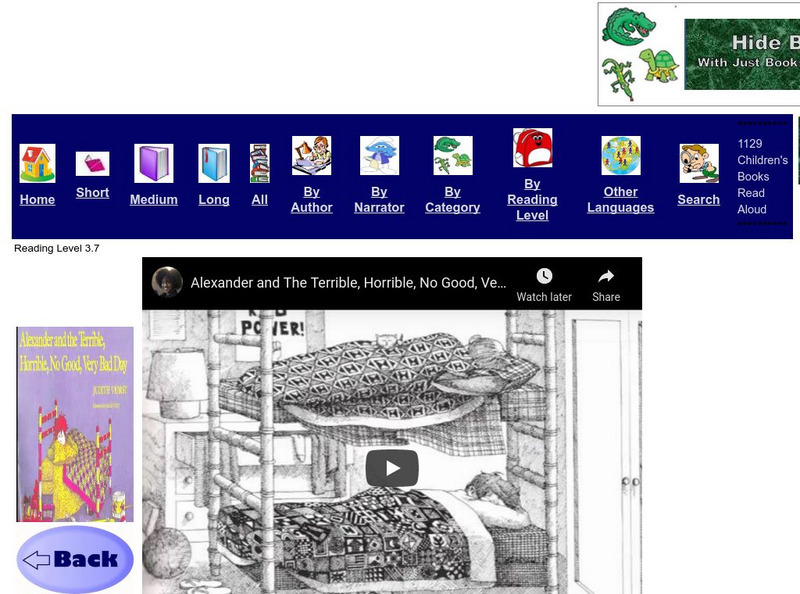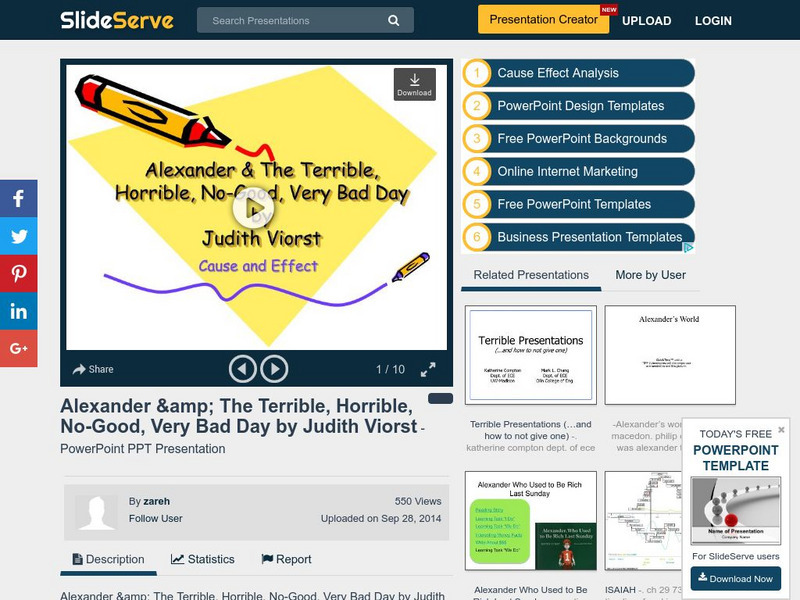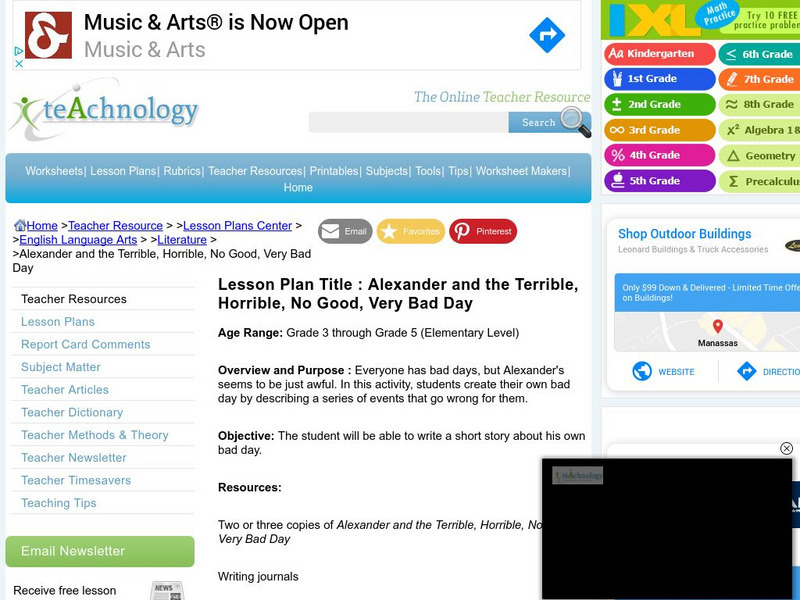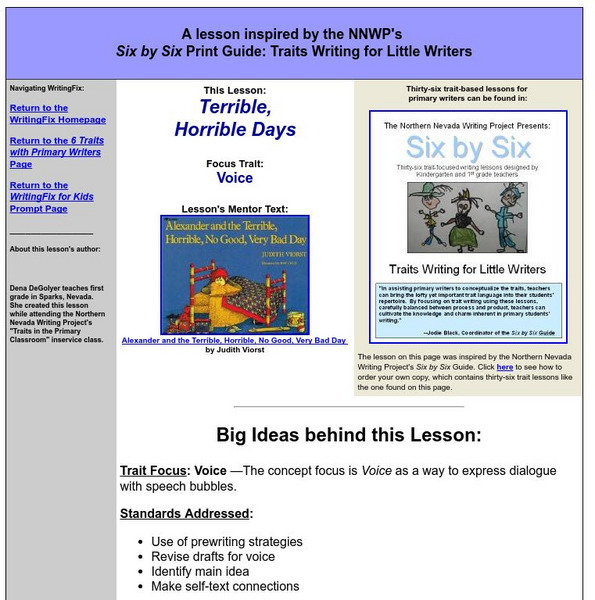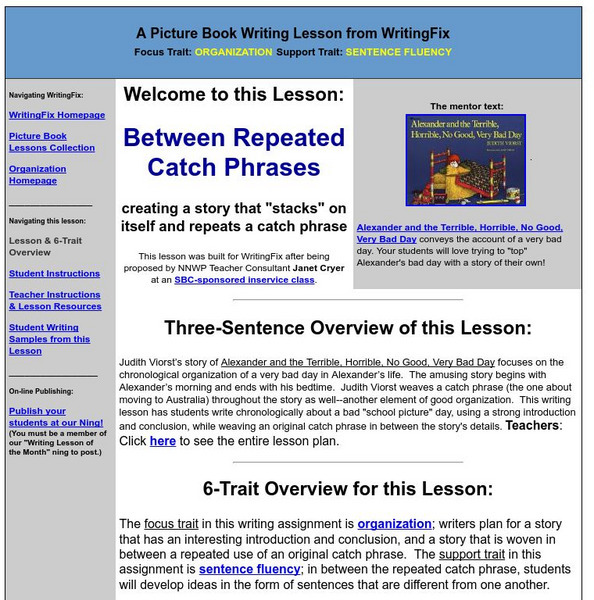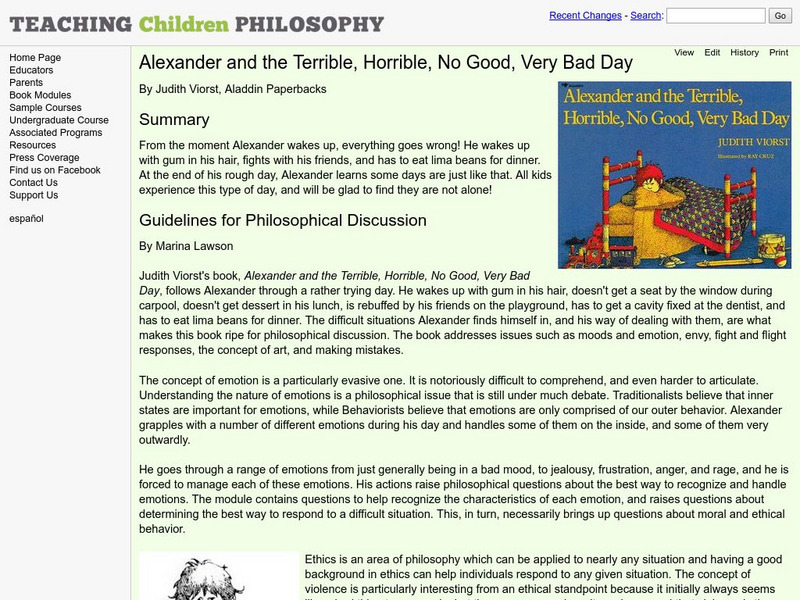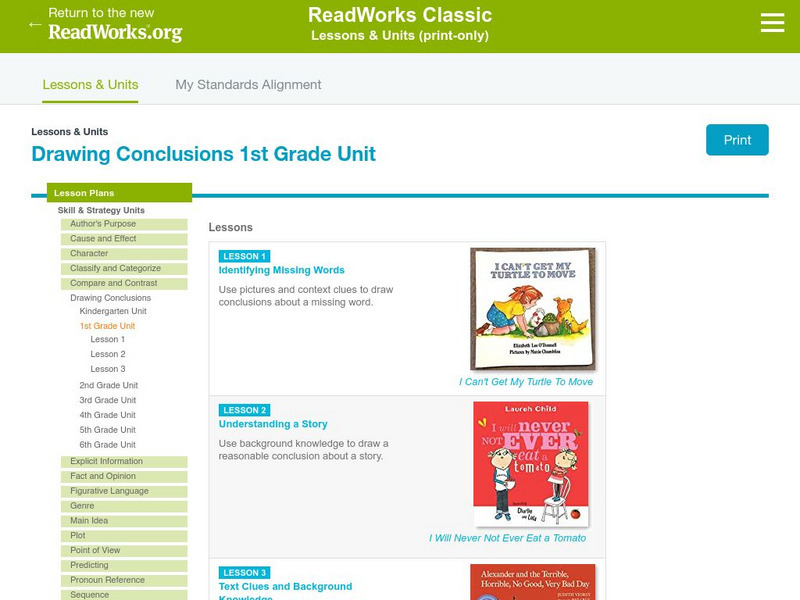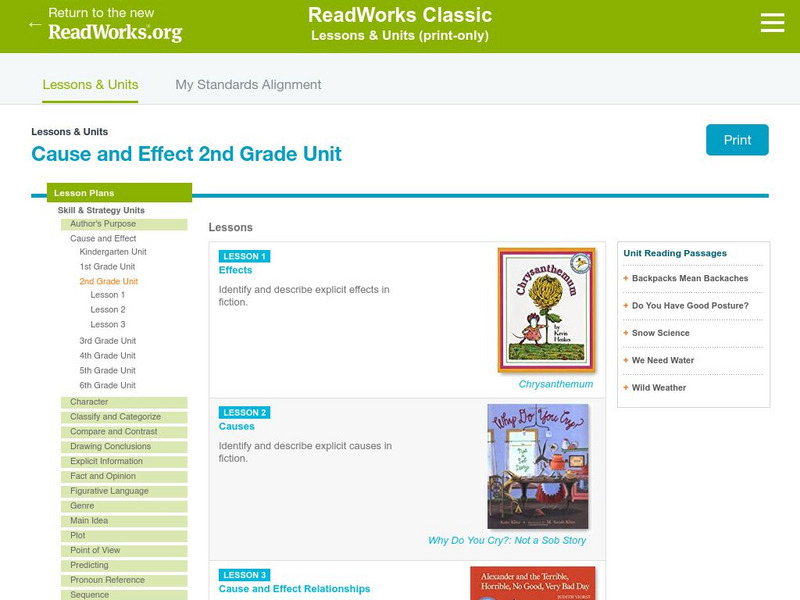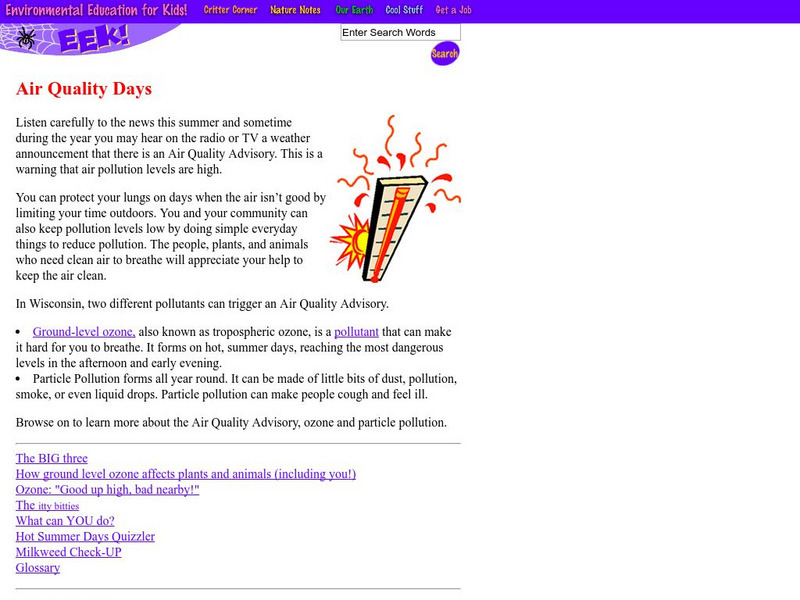Hi, what do you want to do?
Other
Barnes & Noble: Alexander and the Terrible, Horrible, No Good, Very Bad Day
This page provides an overview of Alexander and the Terrible, Horrible, No Good, Very Bad Day by Judith Viorst. Includes several editorial reviews, an author profile, and a video with Judith Viorst narrating the story. [5:37]
Just Books Read Aloud
Just Books Read Aloud:alexander and the Terrible, Horrible, No Good Very Bad Day
A video of the book "Alexander and the Terrible, Horrible, No Good, Very Bad Day", written by Judith Viorist. Just Books Read Aloud is a site that includes children's books read aloud by normal (but enthusiastic) readers.
Alabama Learning Exchange
Alex: My Bad Day
During this writing lesson plan students go step by step through the writing process to create a story about a bad day. Students use graphic organizers and Internet resources to help improve their writing skills.
Other
Slide Serve: Alexander and the Terrible, Horrible, No Good, Very Bad Day
This is a slideshow that examines the cause-and-effect text structure of Alexander and the Terrible, Horrible, No Good, Very Bad Day by Judith Viorst. The lesson plan includes questions for students to answer in their Reading Response...
Teachnology
Teachnology: Lesson: Alexander and the Terrible, Horrible, No Good, Very Bad Day
In this lesson, students use the book Alexander and the Terrible, Horrible, No Good, Very Bad Day as a springboard for writing their own very-bad-day story.
Writing Fix
Writing Fix: Terrible, Horrible Days
After reading the book Alexander and the Terrible, Horrible, No Good, Very Bad Day by Judith Viorst, learners have the chance to express the way they feel when they have a bad day. They will make personal connections as well as develop...
Writing Fix
Writing Fix: Between Repeated Catch Phrases
After reading Alexander and the Terrible, Horrible, No Good, Very Bad Day by Judith Viorst, students learn about writing in chronological order and about using a catch phrase throughout a text in order to unite ideas. Teacher...
Choices Program, Brown University
Choices: Good Atoms or Bad Atoms? Iran and the Nuclear Issue
Learning resource covers two days of instruction with scholarly material including video, readings, and graphic organizer handouts teaches students about the acquisition of nuclear arms, Iran's nuclear program and options for U.S....
Other
National Punctuation Day
This site is dedicated to the importance of punctuation in writing. Find information about each punctuation mark, examples of bad punctuation, and links to punctuation videos and songs.
Other
Teaching Children Philosophy: Alexander and the Terrible, by Judith Viorst
This lesson outline summarizes the philosophical issues embedded in the book Alexander and the Terrible, Horrible, No Good, Very Bad Day by Judith Viorst. This is followed by question sets that teachers can use to guide young scholars in...
Varsity Tutors
Varsity Tutors: Web English Teacher: Alexander and the Terrible, Horrible, by Judith Viorst
This site features several links to lesson plans and activities for Alexander and the Terrible, Horrible, No Good, Very Bad Day by Judith Viorst.
Other
Kirkus Media: Judith Viorst
An interview with Judith Viorst where she talks about her children's book Lulu Walks the Dogs. She describes how she created the character Lulu and her admiration of her illustrator, Lane Smith. She also talks about the impact her book...
Read Works
Read Works: Drawing Conclusions 1st Grade Unit
[Free Registration/Login Required] A three-lesson unit on drawing conclusions through which students learn how to use pictures and context clues to discover a missing word and to draw conclusions about a story. Students also use...
Read Works
Read Works: Grade 2: Three Lesson Unit: Cause and Effect
[Free Registration/Login Required] A series of three lesson plans designed to teach learners to identify effects, causes, and the relationship between them. Lessons are based on the books Chrysanthemum by Kevin Henkes, Why Do You Cry?:...
John F. Kennedy Center
The Kennedy Center: Judith Viorst
This resource provides information about Judith Viorst. It includes a short interview where she answers questions about her book Alexander and the Terrible, Horrible, No Good, Very Bad Day.
Other
Bad Astronomy/phil Plait: Tides and Why Our Days Are Getting Longer
Why does the Moon always shows the same face to the Earth? Why is the Moon's rotation period the same as the length of time it takes to orbit the Earth? Why are there two tides a day? These questions and more are answered here.
TED Talks
Ted: Ted Ed: Is It Bad to Hold Your Pee?
Humans should urinate at least four to six times a day, but occasionally, the pressures of modern life force us to clench and hold it in. How bad is this habit, and how long can our bodies withstand it? Heba Shaheed takes us inside the...
TED Talks
Ted: Ted Ed: Are Food Preservatives Bad for You?
Food doesn't last. In days, sometimes hours, bread goes moldy, apple slices turn brown, and bacteria multiply in mayonnaise. But you can find all of these foods out on the shelf at the grocery store thanks to preservatives. But what...
Meadowbrook Press
Giggle Poetry: "Bad Hair Day" Poetry Theater
In "Bad-Hair Day," students will participate in a poem in three voices. Adapted from the poem by Linda Knaus in If Kids Ruled the School, students will dramatize a poem about how one child's messy hair interrupts the class.
Science Buddies
Science Buddies: Project Ideas: Don't Get Burned: Uv Index Throughout the Day
Sun tanning has a bad rap right now. Use a personal ultraviolet monitor to measure the UV index to prevent getting a sunburn. With this science fair project you will create a chart showing the UV ray measurement at different times of the...
Curated OER
Writing Fix: Terrible, Horrible Days: Alexander and the Terrible...day
Front cover of the book Alexander and the Terrible, Horrible, No Good, Very Bad Day by Judith Viorst.
Other
Chris Van Allsburg
This is the official website for the children's author, Chris Van Allsburg. Includes a biography, interviews, timeline, and many interactive activities. Click on one of his works to take a sneak peek at the book. Winner of the Caldecott...
Environmental Education for Kids
Eek!: Hot Summer Days Ozone Action
Easy to read and understand site from Environmental Education for Kids. Good and bad ozone explained and illustrated. Complete with glossary and Quizzler at the end.
Other
Worksheetsplus: 2nd Grade Reading Comprehension: Bad Hair Day
Read a short literary text titled "Bad Hair Day," and answer the multiple choice reading comprehension questions that follow.






